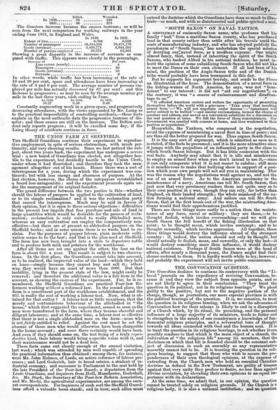"SOUTH SAXON" ON NAVAL TACTICS.
GENTLEMAN of eminently Saxon name, who professes that his family "hail" from a maritime Saxon county, who has purchased land in that county rather than settle after his travels amid the seats of manufacturing industry, and who has adopted publicly the pseudonym of "South Saxon," has undertaken the special mission of decrying our:naval force, as a needless expense. One might almost fancy, that, instead of inheriting the spirit of the South Saxons who backed Alfred in his national defences, he must in- herit the opinion of some subsidizing South Saxon who did not like to meet the Danes on their own element. If all had been of his mind, the position of the Anglo-Saxon tribe and of the Danish tribe would probably have been transposed in this day.
But he supports his argument bravely, and sends to the Times. an illustration of the hour. The demonstration of a naval force in: the fishing-waters of North America, he says, was not " bene- &dent " to our interest : it did not "aid our negotiationson the contrary, it was "a source of embarrassment and disadvan- tage to us.
'It afforded American orators and writers the opportunity of presenting themselves before the world with a grievance: 'Take away that insulting
armed force We will not negotiate under duresse'— 'Americans will never submit to be bullied '—and similar exclamations, formed the chorus of senators and editors, and served as a convenient substitute for a discussion on the real question at issue. We felt the force of these remonstrances. Our Government was assailed with censure at home, and thus weakened in their position as negotiators."
Meanwhile, the Yankees who conquered in the negotiation, avoid the expense of maintaining a naval fleet in time of peace ; and are thus all the better prepared for war. Thus argues South Saxon. It is the easy sort of argument, which is admitted as soon as it is stated, if the facts be presumed ; and it is the more attractive since it jumps with the prejudices of an influential party in the class to which South Saxon belongs. But it has little connexion with the real facts. Anybody may admit that it is idle and mischievous
to employ an armed force when intend don't tend to use it,—since it can only exasperate what it is not meant to subdue ; still more is it mischievous to make that bullying show in support of a posi- tion which your own people will not aid you in maintaining. That was the reason why the negotiations went against us, and not the use of an armed force. As to the American parsimony in the maintenance of a navy, Americans can tell Mr. South Saxon, that just now that very parsimony renders them not quite easy as to their own position in a war, though they can rely, far better than England, on their landed strength ; the whole manhood of the na- tion forming a national army. And sailors can tell Mr. South Saxon, that at the first break-out of the war, the mistrusting Ame- ricans would find their apprehensions justified.
There are three things more costly to a nation than the mainte- nance of any force, naval or military : they are these,—to be thought foolish, which invites overreaching—and we will give South Saxon the full benefit of the fishing illustration on that point ; to be thought mean, which invites contempt ; and to be thought cowardly, which invites aggression. All together, those three things would destroy the influence abroad of the strongest country : if, indeed, the nation should not only be thought, but should actually be foolish, mean, and cowardly, or only the last—it would destroy something more than influence, it would destroy national existence. Perhaps if South Saxon were at the head of affairs, after nearly a thousand years, the Danes might find their chance restored to them. It is hardly worth while to try, however ; and probably the experiment will not invite public concurrence.


























 Previous page
Previous page